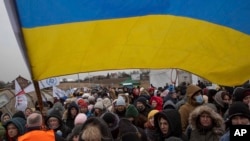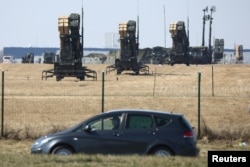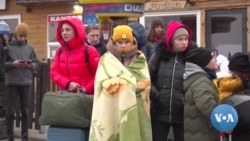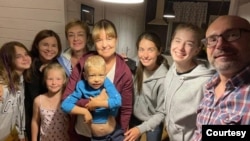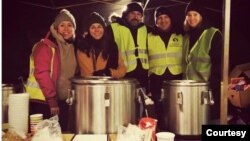Przewodow is still in mourning its two lost sons.
The small village on the Poland-Ukraine border got global attention when, on November 15, a missile exploded on a farm, killing two local workers. All that remains is a large crater, surrounded by the twisted metal beams and rubble of the barn that once stood here.
NATO and Western allies said the explosion was likely caused by a stray Ukrainian air defense missile. But at first, many suspected it was a Russian attack. For a few terrifying hours, the world feared that Russia’s war on Ukraine had come to NATO territory.
Shadow of war
As the conflict escalates, the communities along the border continue to live in the shadow of war. Last year, they watched as millions of Ukrainians rushed into Poland, fleeing the Russian invasion. Meanwhile, Poles are having to adjust to the large-scale warfare taking place on their doorstep.
The airport at Rzeszow in southeast Poland, around 70 kilometers from the border, has become a key hub for transporting Western weapons into Ukraine. The passenger airliners at the terminal are dwarfed by military transport planes from NATO member states and other Ukrainian allies, carrying everything from small arms to Javelin anti-tank missiles and armored vehicles.
The Polish border is likely to be the key conduit for transporting Western tanks to Ukraine, which is set to commence in the coming weeks. Meanwhile the United States and other NATO members have deployed additional troops, armor and Patriot air defense systems to the border region.
Grzegorz Drewnik, who heads the Dolhobyczow commune which includes Przewodow village, says there have been many fearful moments over the past 12 months.
“The worst were the first days of the war, when the front was moving here to the west, and nobody really knew at what point it would stop, nobody knew whether we would be bordering the Russian Federation in any moment,” he told VOA. “Nobody knew whether Ukrainian soldiers, who would probably have to flee across the border - whether they wouldn't cross our border in a disorganized way, with weapons, and whether that wouldn't be the main threat to us."
“Over this last year, a lot has changed. Lots of grief, sadness, anger. Well later on, I guess it's human nature that you get used to everything,” he said.
Fallout
The communities along the border were the first to witness the fallout of Russia’s invasion a year ago.
VOA spoke to two friends, Natalia Kostykiewicz-Kolasinska and Renata Zyla, who both live in Tomaszow Lubelski, a town located a few kilometers from the Ukrainian border. They were closely involved with the refugee response in the early weeks of the war.
“Our family, who live further away from the border, called us very scared. They asked us if we had passports, if we were going to escape in some way. It didn't occur to us at all because we were so involved,” Kostykiewicz-Kolasinska said.
“Very quickly people started coming in. And here our whole community mobilized, and people rushed to help the Ukrainians who were streaming into our town in big numbers,” Zyla said.
“I also think that the fact that people threw themselves into this aid also helped them cope with the fear, with the anxiety, with the feeling of helplessness in the face of what was happening, these horrific stories that people were bringing in. Such psychological wounds and all that suffering,” Zyla added.
Refugees
Close to 10 million Ukrainians have fled to Poland since the Russian invasion on February 24 last year – far more than any other country. Some have returned home, but some 1.4 million have applied to settle in Poland.
Like thousands of other Poles, Kostykiewicz-Kolasinska took in a Ukrainian family - seven people in total, plus their elderly dog and two pet rats.
“It was a challenge for us for sure, but not in terms of sacrifice - they just became our family straight away, especially as we spent Christmas together. We took the children to kindergarten, to school. We tried to make it easier for them to make a start here with us.”
The Ukrainian family has since received visas to emigrate to Canada and moved there a few weeks ago.
‘Plan B’
The two friends say they have got used to living so close to a country now at war – but there are ‘jittery’ days.
“Some of the conversations we have are about what our ‘plan B’ is,” Kostykiewicz-Kolasinska said. “We have in the back of our minds all the time that something is going on. When I wake up at night, you can hear the warplanes, you can hear them really circling overhead. It's hard not to think about the war.”




